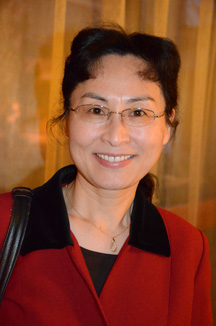A potential game-changing switch in the way the sciences are taught in at least 20 Tennessee K-12 school districts will be at the forefront of this week’s seventh annual Tennessee STEM Education Research Conference in Murfreesboro.

Dr. David Hestenes, center, of Arizona State University, shares the Physics First Approach strategy with MTSU’s Drs. Robert Carlton, left, and Ron Henderson. (MTSU photos by News and Media Relations)
More than 100 science, technology, engineering and mathematics educators from across Tennessee participated in the two-day conference, which was held Feb. 7-8, at the DoubleTree Hotel in Murfreesboro.
The sequence change is called the Physics First Approach. Students learn conceptual physics first in the ninth grade, followed in subsequent years by chemistry and molecular biology.
It’s a concept educators are strongly considering for the future, said Dr. Tom Cheatham, first-year director of the Tennessee STEM Education Center at MTSU. STEM is an acronym for science, technology, engineering and mathematics.
Physics First would alter the current teaching sequence of biology first, chemistry and then physics. Cheatham said the modeling strategy, developed first for physics at Arizona State University, makes a powerful change in how educators teach science in high school.
“The people who invented Physics First say physics is a foundational science,” said Cheatham, the former dean for the MTSU College of Basic and Applied Sciences.
“Chemistry builds on physics and biology builds on chemistry. This has been a real challenge to implement because of the lack of high school physics teachers.”
Cheatham said he is awaiting word on an $8 million National Science Foundation grant, which is under review, before the Physics First Approach with modeling instruction can be implemented across Tennessee.
The National Science Foundation Math/Sciences Partnership grant proposal, titled “Collaborative Redesign of Science in Tennessee,” involves MTSU in the lead role. It’s joined by the University of Memphis, Austin Peay State University, the University of Tennessee at Chattanooga, East Tennessee State University, Oak Ridge Associated Universities and 20 K-12 districts across Tennessee, Cheatham said.

Dr. Ling Liang
During the conference on Thursday, Dr. Ling Liang of La Salle University in Philadelphia, Pa., shared her role in the Physics First Approach and Dr. David Hestenes, the inventor of the teaching strategy for high school physics, described modeling and other national STEM initiatives.
After Thursday night’s dinner, Hestenes discussed “An Engine for STEM Education Reform.”
“Ultimately, all reform is local,” Hestenes wrote in a summary of his presentation. “Therefore, the key to education reform is empowering teachers as agents of change.”
Hestenes is director of the Science Modeling Institute Academy of Science and Arts and emeritus professor of physics at Arizona State.
Cheatham said Dr. Angela Barlow, director of the MTSU Ph.D. program in mathematics and science education, will describe work to improve teaching and learning of math in the elementary grades.
Jamie Woodson, president and CEO of Tennessee SCORE — State Collaborative on Reforming Education — will provide an update on pre-K-12 educational progress in Tennessee. Tennessee Score is a program started by Dr. Bill Frist of Nashville, the former U.S. Senate Republican majority leader.
Cheatham said continuing support for the conference comes from the Tennessee Space Grant Consortium, which has a match from the MTSU Office of Research. MTSU’s Dr. Mark Abolins is the principal investigator for the space grant.
The Tennessee STEM Education Center formerly was called the Tennessee Math, Science, Technology and Engineering Center at MTSU.
For more information, visit http://capone.mtsu.edu/tsec/2013stem or call 615-904-8573.
— Randy Weiler (Randy.Weiler@mtsu.edu)

COMMENTS ARE OFF THIS POST